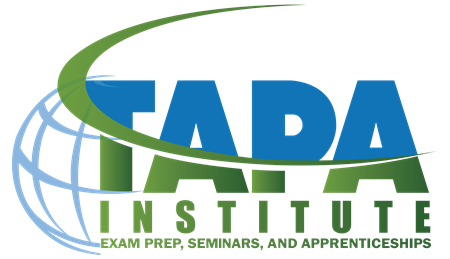CPA Exam Tutoring vs. Self-Study: Which Path is Right for You?
Preparing for the Certified Public Accountant (CPA) exam is a significant endeavor that requires careful consideration of study methods and resources. One of the key decisions candidates must make is whether to pursue CPA exam tutoring or opt for self-study. In this blog post, TAPA Institute compares the pros and cons of each approach to help candidates determine which path is right for them.
CPA Exam Tutoring
Pros:
Personalized Guidance: Working with a CPA exam tutor from TAPA Institute provides candidates with personalized guidance and support tailored to their individual learning needs and preferences. Tutors assess each student's strengths and weaknesses to create customized study plans that target specific areas for improvement.
Accountability: Tutors help keep candidates accountable for their study progress, providing motivation and encouragement to stay on track with their exam preparation. Regular tutoring sessions ensure that students maintain a consistent study schedule and make steady progress.
Expert Instruction: Tutors offer expertise in CPA exam content, study strategies, and test-taking techniques, helping candidates maximize their study efforts and achieve their exam goals. TAPA Institute tutors are experienced professionals who bring valuable insights and practical knowledge to the table.
Feedback and Support: Tutors provide valuable feedback and support, identifying areas of weakness, offering strategies for improvement, and answering candidates' questions to ensure comprehension. This immediate feedback loop helps students correct mistakes and solidify their understanding.
Cons:
Cost: CPA exam tutoring can be a significant financial investment, especially for candidates on a tight budget. However, TAPA Institute offers competitive pricing and flexible payment plans to make tutoring accessible to more candidates.
Time Commitment: Tutoring sessions require a time commitment from both the candidate and the tutor, which may be challenging to accommodate with busy schedules. However, TAPA Institute offers flexible scheduling options, including evening and weekend sessions, to accommodate different needs.
Dependency: Some candidates may become overly reliant on their tutor for guidance, which can hinder their ability to develop independent study skills and self-reliance. It’s important for students to balance tutoring with independent study to build confidence in their abilities.
Self-Study
Pros:
Flexibility: Self-study offers flexibility in terms of study schedule, pace, and location, allowing candidates to study at their own convenience and according to their individual preferences. This approach is ideal for candidates with unpredictable schedules or those who prefer to study at their own pace.
Cost-Effective: Self-study materials are often more affordable than tutoring services, making self-study a cost-effective option for candidates on a limited budget. There are many high-quality, budget-friendly resources available, including textbooks, online courses, and practice exams.
Independence: Self-study encourages candidates to take ownership of their exam preparation, fostering independence, self-discipline, and self-motivation. This approach helps build essential skills that are beneficial in both exam preparation and professional practice.
Comprehensive Resources: There are numerous self-study resources available, including textbooks, online courses, practice exams, and review materials, catering to different learning styles and preferences. Candidates can tailor their study plan to their specific needs using these diverse resources.
Cons:
Lack of Guidance: Self-study lacks the personalized guidance and support provided by a tutor, which may result in gaps in understanding, ineffective study strategies, or difficulty navigating complex topics. This can lead to frustration and decreased confidence.
Accountability: Without the accountability provided by a tutor, candidates may struggle to stay motivated and focused on their study goals, leading to procrastination or inconsistency in study habits. Self-study requires a high level of self-discipline and time management skills.
Limited Feedback: Self-study materials may not offer the same level of feedback and support as working with a tutor, making it challenging for candidates to identify areas of weakness or track their progress effectively. Without regular feedback, students might miss critical areas that need improvement.
Conclusion:
In conclusion, both CPA exam tutoring and self-study offer unique advantages and challenges for candidates preparing for the exam. The right approach depends on individual learning preferences, study habits, budget considerations, and the level of support and guidance needed. TAPA Institute’s CPA exam tutoring provides personalized, expert instruction that can significantly enhance a candidate's preparation, while self-study offers flexibility and cost savings. By carefully weighing the pros and cons of each approach, candidates can make an informed decision that best aligns with their exam preparation goals and preferences.
TAPA Institute is here to support you on your journey to becoming a CPA. Whether you choose tutoring, self-study, or a combination of both, we provide the resources and guidance needed to help you succeed.

